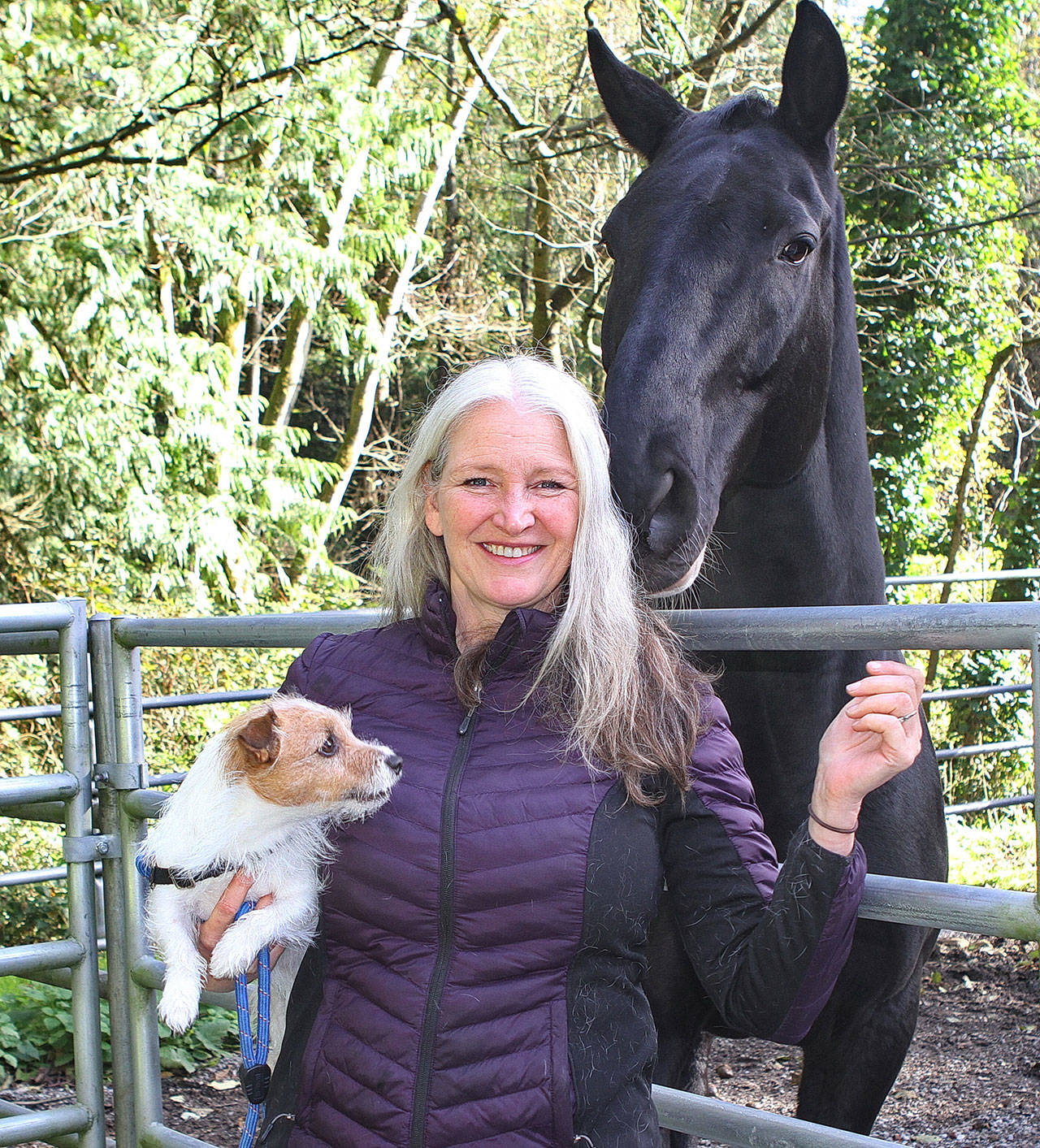By Phil Clapham
For The Beachcomber
When Lola Michelin tells people that she runs an animal massage school, the response is often surprise that this is a professional occupation.
A typical response, she said, is “That’s cute – do you actually make money doing that?”
Michelin founded and directs the Northwest School of Animal Massage, based at Paxhia Farm, just north of the center of town. The farm sits in a peaceful setting on 12 acres of wooded land and is currently host to eleven horses (including three miniatures), a donkey, two goats, a couple of dogs and a random collection of chickens.
Now in her 30th year in this profession, Michelin has trained countless people in the art of massaging horses and dogs.
Born in Detroit, Michelin originally intended to enter veterinary school, and was working as a vet tech when she first became exposed to animal massage, with horses. She learned her craft working at racetracks in Detroit and Florida. At that time, there were no massage schools offering formal training. She opened hers in Redmond in 2001, one of the first in the U.S. It began with horses, but a year or so later she branched out to include dogs.
“People who have horses have dogs,” she said. “It was a natural progression.”
Nine years ago this month, Michelin moved herself, her husband David Cota-Robles and the school to Vashon, where she loves being a part of the local community. Cota-Robles also works for the school, as its information technology officer. Their farm was purchased in part, Michelin said, to provide a facility for retired horses.
Most of the horses at the farm are older or have issues — for example, one of the miniatures is blind — and receives frequent massages from students as part of their hands-on training.
The uninitiated might think of animal massage as something akin to glorified petting, but it’s a great deal more than that. The school’s courses involve sophisticated techniques, and the instructors teach detailed knowledge of the anatomy, behavior and pathology of the animals. It’s a serious business.
“It’s the difference between a professional massage and your partner giving you a back rub,” Michelin explained. “They’re both great, but one’s worth paying for.”
The school offers courses taught by multiple instructors at a variety of levels, for both horses and dogs. This includes “the FUNdamentals of Animal Massage,” an introductory course which many people take to acquire skills that can be used on their pets right away.
Michelin noted that once people see the relief that their pets obtain from professional massage, they’re won over. This is particularly true of older dogs who have joint problems or other health issues. As any older person with arthritis or sore muscles can appreciate, massage can really help alleviate pain, stiffness and circulation — it’s no different for animals.
The higher-level courses are aimed at people who want a career in animal massage and need the training required to attain certification. In Washington, this is essential. There are 19 states that have some form of regulation regarding professional animal massage. A few states restrict the practice to veterinarians; of those that don’t, Washington has the most stringent requirements, which involve a formal exam to obtain certification and a license.
There are also continuing education courses for veterinarians, vet techs, dog trainers, and the like. The school’s 20th anniversary will feature a grand relaunch of their website, with a new learning management system that gives students enhanced online options. It will also include some free introductory classes for the public.
There are two other animal massage schools in our state, but both confine themselves to equine work. Michelin’s school has more board-certified graduates than any in the country, and it was the first institution to offer a hybrid approach to learning, combining online courses with hands-on practical experience.
Her expertise is also recognized internationally: she’s taught courses in countries as far apart as Canada and Japan, and Mexico and New Zealand. But Vashon is definitely home, and she is involved with several community organizations here, including the Olympus Pony Club, the local 4-H, and Vashon Island Pet Protectors.
Indeed, there’s a lot of charity work involved. The Northwest School’s faculty has taught massage at numerous animal shelters and therapeutic riding centers in the US, to bring massage to the animals that need it most. Michelin has even taught animal massage to inmates at an Oregon youth correctional facility, and at women’s prisons in Washington and British Columbia. With all this, plus a private equine practice, she rarely has a lot of time to herself.
Although these days she’s primarily occupied with horses and dogs, her experience goes well beyond this. Years ago, before she began her own school, Michelin worked for a time at Busch Gardens and other zoos and found herself applying massage to a wide variety of exotic animals.
“I’ve done the A to Z,” she said, with a laugh. “Everything from aardvarks to zebras.”
Recently, she was called in by the Woodland Park Zoo in Seattle to work on Hasani, a giraffe that had been born with hind limb deformities.
“Giraffes are my favorite exotics,” she said. “They’re unique physiologically. And, she added, again with a laugh, “With those long eyelashes, they give the best butterfly kisses.”
More information about the programs offered by the Northwest School of Animal Massage can be found by visiting nwsam.com, writing to info@nwsam.com or calling 877 836-3703.


